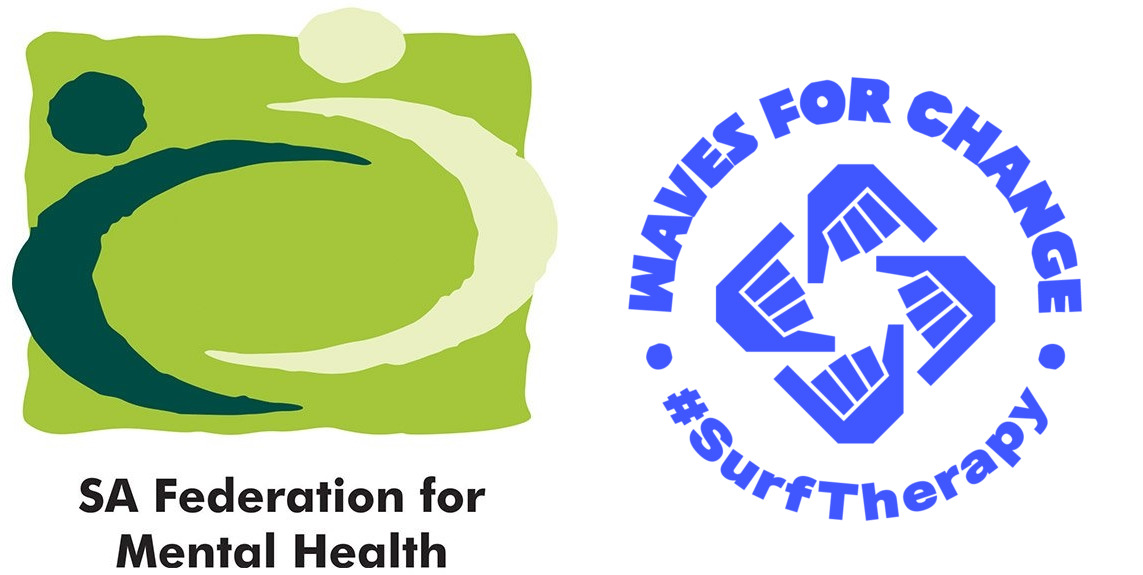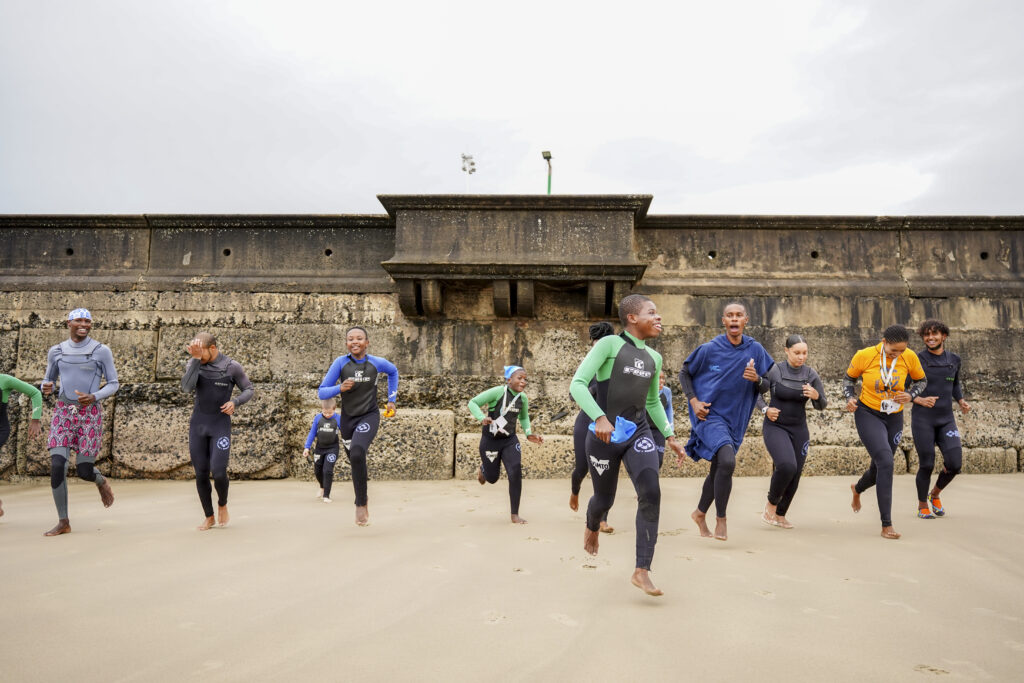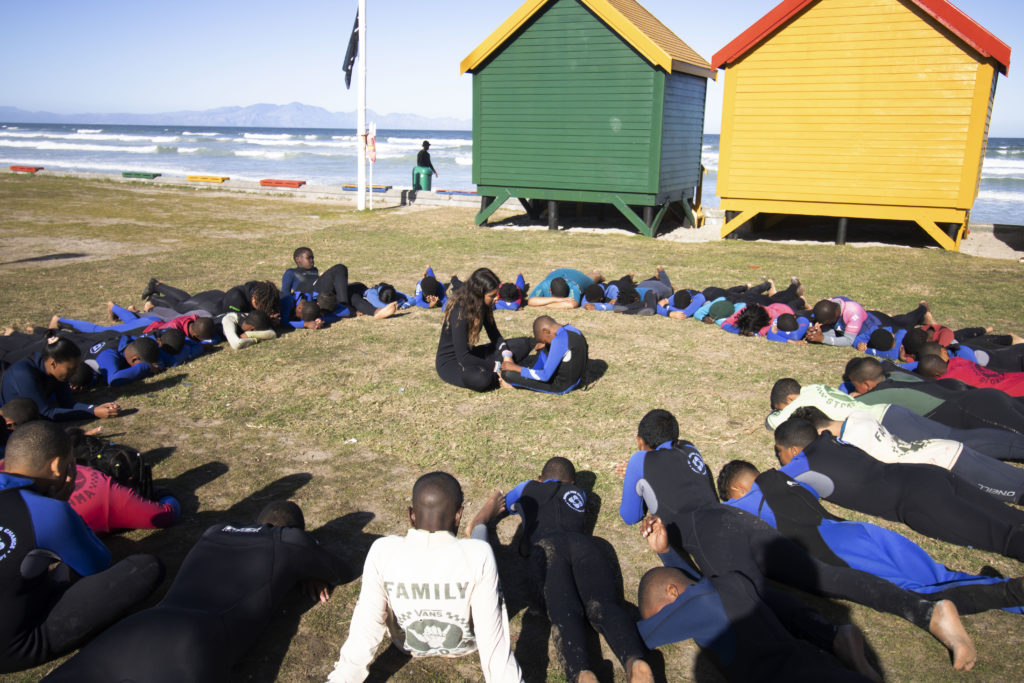SA FEDERATION FOR MENTAL HEALTH & WAVES FOR CHANGE

“How Can We Use Sport To Improve Mental Health In South Africa?”
Sports-based interventions can be used as an effective means to promote mental health. The South African Federation for Mental Health (SAFMH) and Waves for Change partnered together to share their learnings on how sport (in particular, surfing) can be used in conjunction with other evidence-based practices to improve mental health.
SAFMH is a national mental health-focused, human rights organisation, and advocates for all people in South Africa to access the quality mental health care they need. We work with 17 community-based organisations affiliates who provide direct services and support to mental health care users across the country, including prevention and promotion interventions. We run a mental health helpdesk, through which we provide information and provide people in need with referrals to mental health and other service providers, and we also act as a resource centre on all things mental health.
Waves for Change is an evidence-based, youth-friendly, preventative mental health intervention. based on a youth-led PhD study on what children felt was important for them to be able to experience positive well-being. Waves for Change provides surf therapy to youth between 9 and 16 years across 5 beach sites in the Western and Eastern Cape provinces of South Africa. The programme works with children who have been exposed to toxic stress as well as neurodiverse children living in under-resourced communities, to help them gain self-mastery and coping tools to deal with stressful events in their communities. Waves for Change has over 2000 participants attending weekly sessions across the beach sites per year and works closely with schools and other community partners.
In the following sections, we explain what mental health is and what the benefits of sport-based health promotion interventions are at an individual and country level. We also explain why investing in community sports-based interventions should be seen as a priority area for resourcing to improve mental health in South Africa.
What is Mental Health?
- We all have mental health, just like we all have physical health. Your mental health needs to be looked after, just like you look after your physical health.
- Mental health is when you feel well, can cope with normal stresses of life, work productively and contribute to your community.
- Mental health is NOT a mental health condition.
- A mental health condition is clinically diagnosed by a mental health care professional, like a clinical psychologist, clinical social worker or psychiatrist.
- Anyone can get a mental health condition. In 2017, 10.7% of people worldwide were living with a mental health disorder (792 million people).
- There is nothing shameful about having a mental health condition, just like there is nothing shameful about having high blood pressure, diabetes, or cancer.
How can surfing (as a type of sport) be used to promote a person’s mental health?
People expect many things from men in our community. They say things like “men don’t cry ‘’. Since being at W4C, I have learned things as they have equipped me with many tools. I know if I am stressed now, I know how to calm down by doing meditation and Take 5. I share this with other boys.
Luxolo Ponco _ Waves for Change youth mentor and past programme participant [taken from the 2020/2021 Waves for Change Annual Report]
Physical activity, and especially difficult individual pursuits that can be done in a group setting, such as surfing, are effective catalysts for mental health prevention and intervention innovations. These activities require focus and induce flow states (when you feel completely immersed in what you are doing). This in turn allows respite for participants from negative thoughts and emotions.
Surfing (and sport in general) provides opportunities to build social connections and improve the management of emotions if coupled with evidence-based activities. Providing a physical and emotional safe space in areas where mental health provision and social support structures are lacking has been found to be key in a community-based mental innovation.
By integrating service provision within a physical activity context, initial stigma related to mental health discussions is avoided. Participants who engage in sport may experience benefits such as feeling a sense of belonging and building self-esteem and resilience. They can also learn skills to maintain their mental health, learn how to identify when they are struggling with their mental health, and what actions they should take to deal with this.
How can sport be used to support mental health at a country level?
- Based on extensive research, The World Health Organisation (WHO) created a diagram (on the following page) explaining the optimal mix of mental health services in a country.

- Interventions that promote self-care[1] and are based in the community form the pyramid foundation. These are relatively low-cost and should be easily accessible.
- An example of such interventions would be ones that pair sport with evidence-based therapeutic practices (e.g. cognitive behavioral therapy or behavioural activation) to promote mental health.
- In a country like South Africa, where conversations around mental health are still stigmatised and Western therapy models are viewed as taboo and at times culturally inappropriate, sports therapy can be easily adapted into communities with less resistance or having individuals feeling a sense of exclusion from the greater community.
- These sport-based health promotion interventions often do not require specialist mental health professionals, but still provide effective and cost-effective mental health support. Through the use of task-sharing– where non-specialist health workers (e.g. lay counsellors, and peer mentors) are trained to provide psychosocial interventions – we can increase access to mental healthcare nationally. This is especially important in countries like South Africa where there are simply not enough specialised human resources for mental health care in the country.
- In 2019, only three of the nine provinces have child psychiatrists working in the public sector
- Unfortunately, in South Africa, the triangle is inverted. Of the meagre 5% of funding dedicated to mental health from the public health budget, 86% is spent on inpatient psychiatric care. This means only a fraction of the people who require mental health support in the country are able to access it.
- We do not have enough interventions that promote mental health at a community level. Sport-based health promotion interventions do this. We need more of these interventions, especially for young people, since mental health problems experienced during this critical developmental period can create immediate and long-term detrimental effects on functioning, development, and wellbeing including poorer social functioning, increased risk of unemployment, impaired academic achievement, and increased risk of self-harm and suicide.
- In resource-constrained countries like South Africa, there is a need to establish novel, youth-friendly, and accessible community-based services that speak to and are informed by youth and which can complement any established hospital-based care models for youth mental healthcare, of which there is not much available at present.
- This would allow us to address many mental health problems before they turn into mental health conditions. This is not only of benefit for the individual, but also places less of a burden on our healthcare system and on the economy.
[1] ‘Self-care’ is your ability to maintain your health and/or coping with living with an illness. Self-care often means continuing to do behaviours that are good for you and bring meaning to your life. Self-care looks different for everyone. It could be a good night’s sleep, connecting with a colleague, or going for a walk. It’s important to find what works for you. Self-care does not mean going shopping and having bubble baths.
Why should we invest in sport-based mental health promotion interventions?
- Sport-based health promotion interventions have been found to improve mood, build self-esteem and decrease the risk of developing other non-communicable diseases such as diabetes and obesity, including and among youth.
- Interventions that use sport have been found to be appropriate by participants. In a systematic review, researchers found participants across several studies reported positive experiences with sport-based health promotion interventions, which suggests that youth enjoy participating in sports while learning about essential health practices.
- These interventions are relatively low-cost and rooted in the community, making them more accessible.
How do I learn more?
Waves for Change operates its youth-friendly mental health service from 5 beach sites across the Eastern and Western Cape provinces of South Africa. Waves for Change focuses on coastal communities specifically in township communities affected by violence, poverty, and conflict, where mental health services are often stigmatised and under-resourced. To find out more about their work, you can contact them at: info@isiqalo.org.
SAFMH offers an enquiries desk for anyone who has questions about accessing mental health services. We are also moving into winter, a time when fewer people are likely to engage in physical activity to maintain their mental wellbeing. We urge you to take care of yourself during this time. One such way is linking you to resources, such as a self-care plan for how you are going to prioritise doing behaviours that are good for you or available community-based mental health organisations in your areas. You can contact them at: info@samfh.org.
For enquiries, please contact:
Aviwe Funani – Waves for Change Policy and Advocacy Manager
CELL: +27 (0)78 312 8403
EMAIL: aviwe@isiqalo.org
Michel’le Donnelly – SAFMH Project Leader: Advocacy & Awareness
CELL: +27 (0)79 799 6533
EMAIL: michel’le@safmh.org


